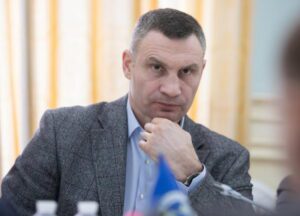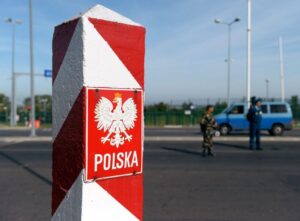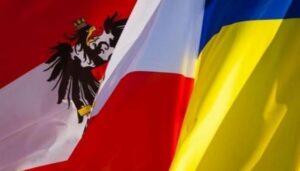
331 foreign doctors are currently officially working in Ukraine, Minister of Health Viktor Lyashko said.
On the air of the telethon on the 1+1 channel on Wednesday, he noted that these are the doctors who are officially employed and registered with the Ministry of Health.
The minister clarified that in fact there are more foreign doctors working in Ukraine, but not all of them are registered by the Ministry of Health.

The mayor of Kyiv, ex-world heavyweight boxing champion Vitali Klitschko has been awarded the prestigious Arthur Ashe Courage Award, Boxing Scene reports.
The award is presented by the American television channel ESPN to a worthy representative of the sports community for his work, which goes beyond sports and has a significant impact on the world.
“Vitaliy’s poise and strength as his city and country face unfathomable trials far exceeded the incredible determination he displayed as one of boxing’s finest heavyweight champions. His dedication to the people of Ukraine has been an inspiration to the world and his courage is a shining example of the bones of the human spirit. We are honored to present him with the Arthur Ashe Award for Courage,” said ESPN Content executive editor Rob King.
The publication emphasizes that Vitali Klitschko became a central figure in the defense of his country when Russian troops invaded Ukraine.
In turn, Klitschko noted that he perceives this award as recognition of the courage of every Ukrainian who defends his state.
“It is a great honor for me to receive this award. I am convinced that this is a recognition of the courage and inviolability of the Ukrainian people, who have courageously resisted the Russian aggressor for more than 3 months. This is an award for everyone who defends the independence and freedom of Ukraine,” he said.
The Vitali Klitschko award ceremony will take place on July 20.
The Arthur Ashe Award for Courage is one of the most distinguished, prestigious and well-known awards in sports. Previously, it was awarded to such stars and figures as Muhammad Ali, Nelson Mandela and others.

Lviv customs is expanding the capacity of two checkpoints on the border with Poland, said at a briefing acting. head of the Lviv customs Daniil Menshikov.
According to him, since this morning, trucks up to 7.5 tons have been allowed to enter the Grushiv checkpoint, and earlier there was a limit of no more than 3.5 tons.
Also, at the Krakovets checkpoint, work is underway on the construction of temporary modules for the passage of cars on the A4 highway
“We plan to open this road next week, and we will use all 8 lanes at the Krakovets checkpoint for passing trucks,” Menshikov said.
In turn, Igor Matviychuk, deputy chief of staff of the Western Regional Directorate of the State Border Service, said that vehicles up to 7.5 tons were also allowed to pass at the Ustilug checkpoint in the Volyn region, which should reduce the load on the Yagodyn checkpoint.
According to him, work is also underway on the border with Romania – the Krasnoilsk checkpoint is 90% ready for commissioning, and the Dyakovtsy checkpoint is 60%.
The possibility of resuming the work of checkpoints on the railway in Transcarpathia is also being considered – we are talking about the checkpoints “Dilov” and “Teresva”.
Retail turnover in Ukraine by regions in Jan 2021 (UAH mln)


The Ukrainian Grain Association (UGA) has asked the government to organize a grain corridor for transporting grain to the Danube river ports through the border crossing near the village of Palanca (Moldova), the road to which was not previously used for agricultural exports.
The UGA proposed the corresponding route as an alternative to the railway bridge across the Bilhorod-Dnistrovsky estuary, which was damaged due to repeated shelling by Russians and now does not function, according to the association’s website.
The UGA recalled that before the Russian invasion, Ukraine exported 95-98% of agricultural products through seaports, in natural terms – 5-6 million tonnes per month. However, after the blockade of the Black Sea seaports, Ukraine can transport no more than 1.5 million tonnes per month by alternative routes.
“Currently, most of the grain exports are carried out through the Ukrainian ports of the Danube. Unfortunately, one of the ways to access the Danube ports is the bridge over the Bilhorod-Dnistrovsky estuary, which is damaged, and now the movement of rail cars and road transport is very difficult. An alternative way to access the Danube ports is the road through the village of Palanca (Moldova),” the UGA points out.
Meanwhile, the road to Palanca was not previously used for the transport of commercial goods, so its capacity is significantly limited.
Given the above and the current state of affairs in Ukraine, the UGA asks the government to create a “green corridor” for the transportation of grain cargo for export through the Danube ports, in particular in the area near the village of Palanca.
The Ukrainian Grain Association is an association of producers, processors and large grain exporters who annually export about 90% of Ukrainian grain products.

Verkhovna Rada Chairman Ruslan Stefanchuk said he hoped Austria would realize the strategic role of Ukraine as a guarantor of security for Europe.
“I hope Austria will realize the strategic role of Ukraine as a guarantor of security for Europe as well as economic potential of our country and support Ukraine’s EU aspirations,” he said during a meeting with President of the National Council of Austria Wolfgang Sobotka in Vienna on Tuesday.
According to a statement posted on the website of the Ukrainian parliament, the officials discussed support for Ukraine on its way towards obtaining the status of EU candidate, Austria’s participation in the revival of Ukraine, and punishment for the aggressor country Russia for waging the war against Ukraine.
Stefanchuk stressed the importance of a regular inter-parliamentary dialogue and the recognition by the Austrian parliament of the 1932-1933 Holodomor famine in Ukraine genocide against the Ukrainian people.
He also invited his Austrian counterpart to visit Ukraine.